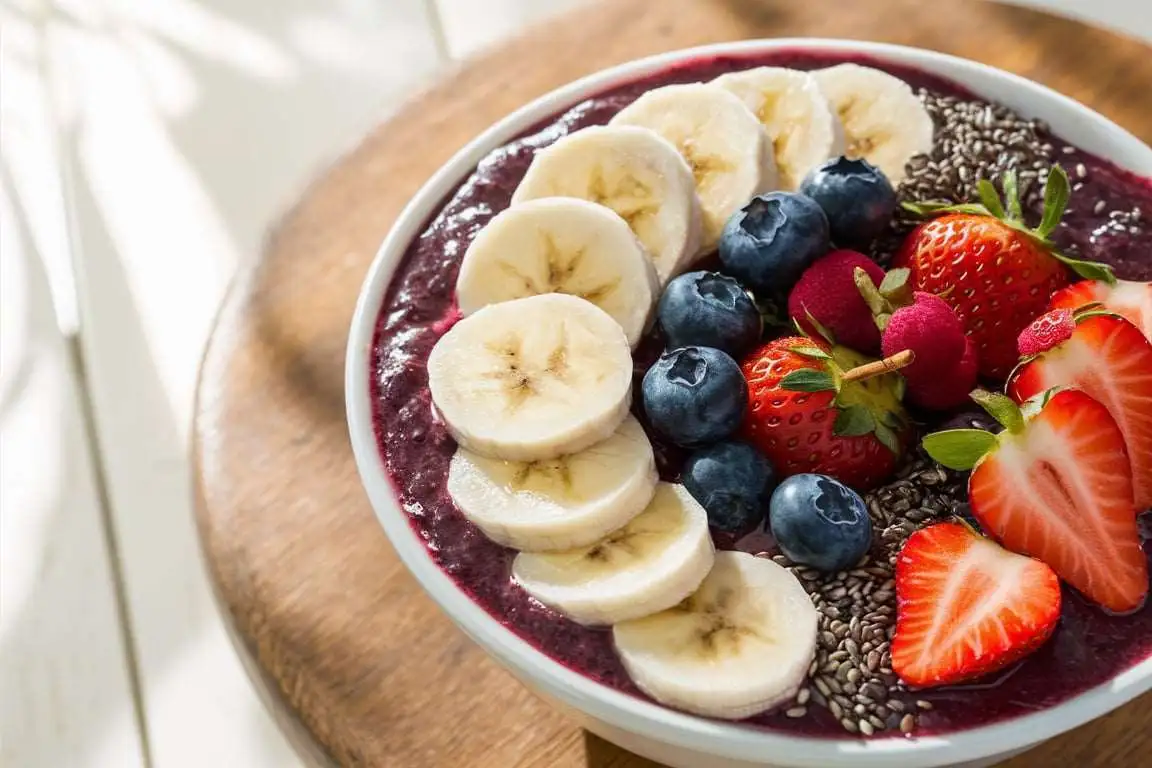Have you ever asked yourself, “Is acai good for you to lose weight?” This tiny purple berry is famous in health circles. It’s known for its antioxidants, fiber, and unique taste. But does it really help with weight loss? Or is it just another trend? Let’s explore what makes acai special and how it can fit into your weight-loss plan.
Table of contents
Why Do People Ask, “Is Acai Good for You to Lose Weight?
Let’s start with the basics. Acai (pronounced ah-sigh-EE) is a small, dark purple berry that comes from the acai palm tree, native to the Amazon rainforest. For centuries, it’s been a staple in the diets of indigenous tribes in South America. They often referred to it as a “tree of life” fruit due to its supposed health benefits.
But acai didn’t stay confined to the Amazon. It burst into the global scene thanks to its label as a “superfood.” Packed with antioxidants, fiber, and healthy fats, acai quickly became a favorite in the health and wellness community.
Why Acai Is Considered a Superfood
Before we dive deeper into the question, “Is acai good for you to lose weight?”, let’s understand what makes this little berry a superstar. Packed with antioxidants, healthy fats, and essential nutrients, acai is touted as one of the most nutrient-dense fruits in the world. These benefits have led many to believe it can play a role in weight management.
Think of acai as nature’s tiny powerhouse. A single serving of acai can provide a significant amount of anthocyanins (a type of antioxidant also found in blueberries). These antioxidants fight free radicals in the body, which helps reduce inflammation and support overall health.
The Nutritional Profile of Acai Berries
Acai berries might be small, but they pack a serious punch when it comes to nutrients. Let’s break it down:
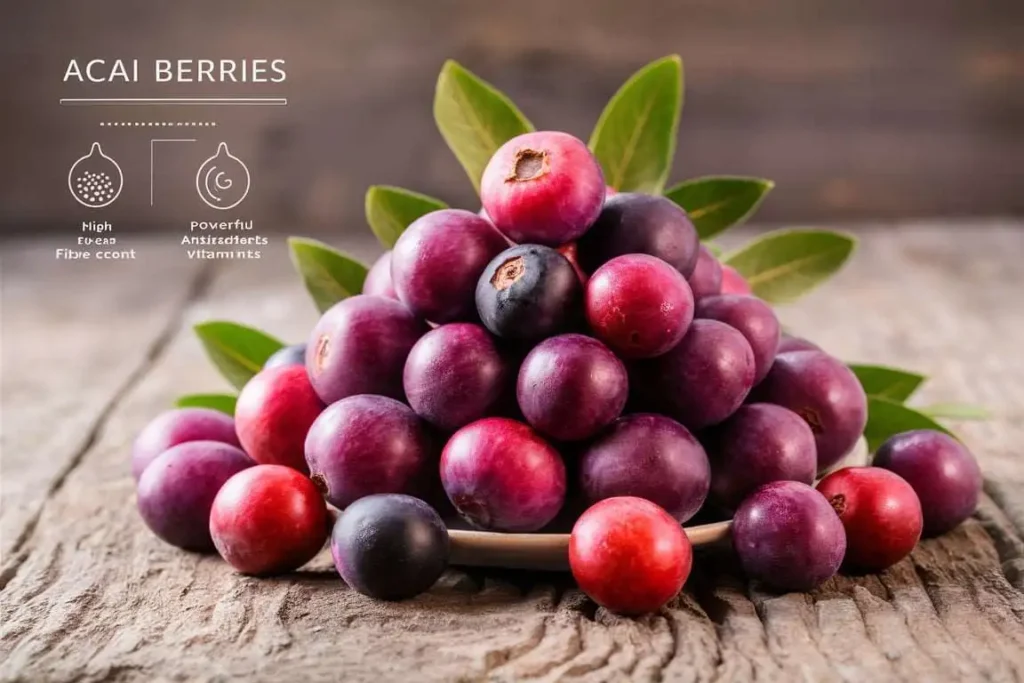
Vitamins and Minerals in Acai
Acai is loaded with essential vitamins like Vitamin A, which supports healthy skin and vision, and Vitamin C, which boosts immunity. It also contains small amounts of calcium, which is great for bone health.
Antioxidant Properties of Acai
Here’s the star of the show: antioxidants. Acai berries rank incredibly high on the ORAC (Oxygen Radical Absorbance Capacity) scale, which measures a food’s antioxidant levels. This makes them great for reducing oxidative stress, a key factor in weight gain and aging.
“Antioxidants in acai are like a shield for your cells, fighting off damage that can slow down your metabolism.”
Acai’s Caloric Content: A Breakdown
A typical serving of acai pulp contains around 70 calories, most of which come from healthy fats and dietary fiber. Unlike sugary snacks or processed foods, acai provides a satisfying, nutrient-dense option that keeps you full for longer.
The Role of Acai in Weight Loss
So, is acai good for you to lose weight? While it’s not a magic solution, it has properties that can support your weight-loss goals. Acai’s high fiber content keeps you full for longer, reducing the urge to snack between meals. Additionally, its antioxidants help combat inflammation, which can interfere with your metabolism and weight management.
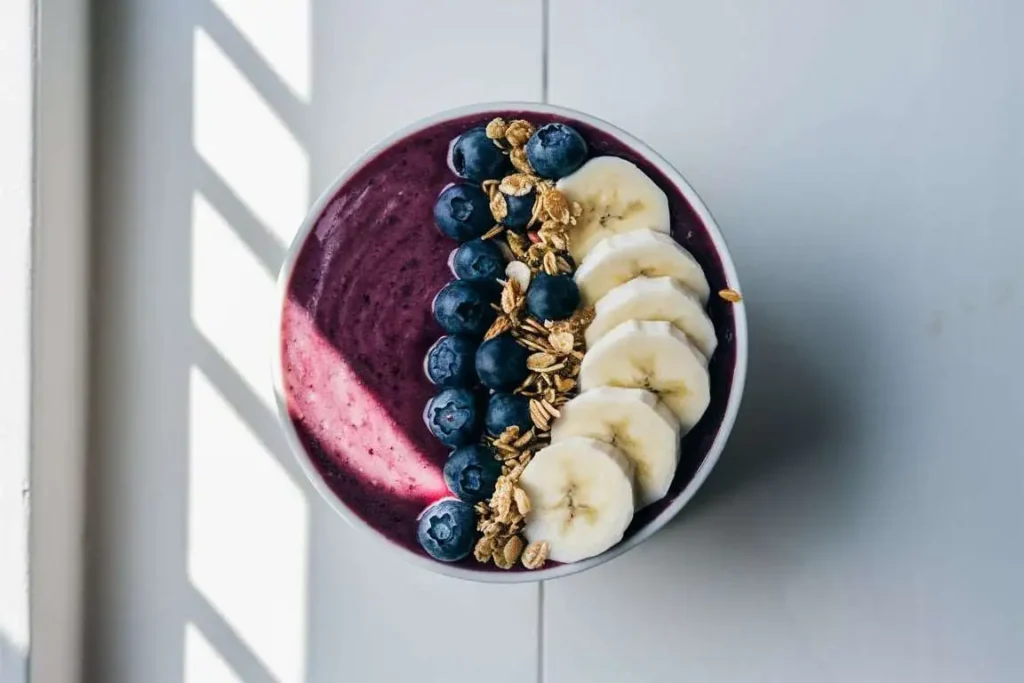
How Acai Supports Metabolism
First off, acai may boost your metabolism. While no food directly melts fat, acai’s nutrient profile can support better metabolic function. Its antioxidants help combat inflammation, which can interfere with how your body burns calories.
Acai and Appetite Suppression
Ever feel like you’re starving an hour after a meal? Acai’s high fiber content helps prevent that. Fiber slows digestion, keeping you full and reducing the urge to snack mindlessly.
“Adding acai to your breakfast can act like an anchor, keeping your hunger in check until lunch.”
Fiber in Acai and Its Impact on Digestion
Good digestion is critical for weight management. Acai supports your gut by providing prebiotics, which feed healthy gut bacteria. A happy gut means better digestion and less bloating—both of which contribute to feeling lighter and healthier.
Common Misconceptions About Acai and Weight Loss
Is Acai a Magic Weight Loss Solution?
Here’s the truth: no single food, no matter how nutritious, is a magic bullet for weight loss. Acai is a tool—an excellent one, but just a tool. Pairing it with a healthy lifestyle is key.
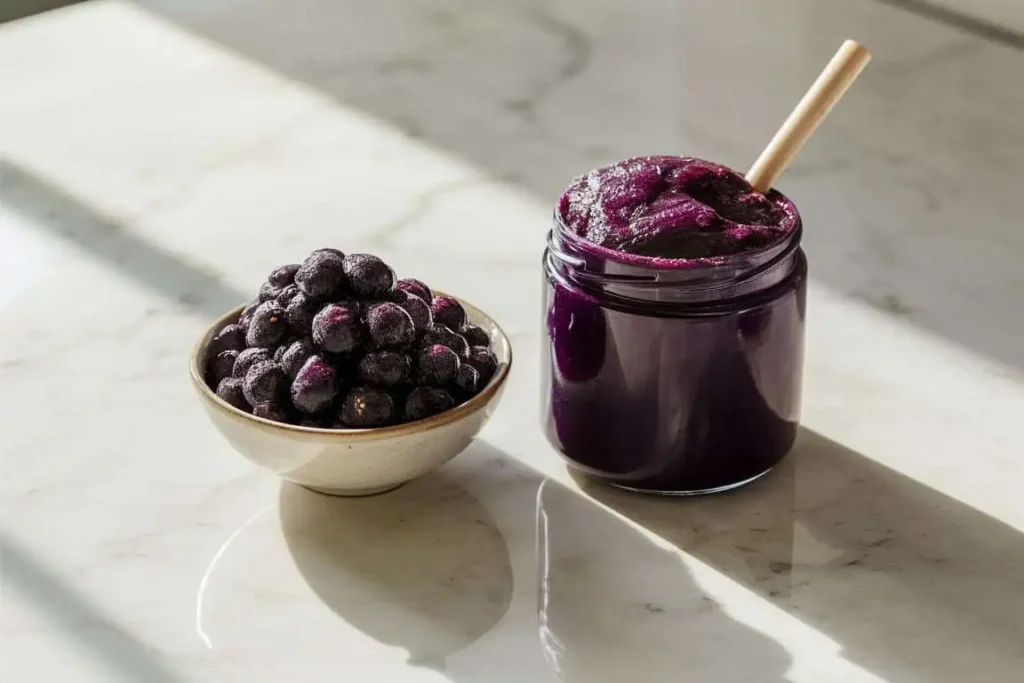
Can Acai Alone Help You Shed Pounds?
Some people buy into the hype that eating acai every day will make the pounds melt away. Sorry to burst the bubble, but weight loss requires a combination of factors: a calorie deficit, regular exercise, and good sleep. Acai can enhance your efforts, but it won’t do the heavy lifting alone.
Scientific Studies on Acai and Weight Management
The question remains: Is acai good for you to lose weight, according to science? Research suggests that acai’s nutritional profile can support a healthy metabolism and improve digestion. However, while some studies show promising results, they also highlight that acai should be part of a balanced diet rather than a standalone solution.
Evidence Supporting Acai’s Role in Weight Loss
One study published in the Journal of Agriculture and Food Chemistry found that acai pulp can help reduce the negative effects of a high-fat diet. Researchers observed that participants who consumed acai experienced better regulation of cholesterol and improved metabolic function.
Another small study showed that consuming acai may help stabilize blood sugar levels, which is crucial for avoiding those pesky sugar cravings that can derail weight-loss efforts.
“Acai doesn’t burn fat—it sets the stage for your body to function more efficiently, making your weight-loss journey smoother.”
Studies Debunking Acai-Related Myths
On the flip side, some studies argue that the hype around acai might be overstated. For example, while acai is rich in antioxidants, there’s limited evidence directly linking it to significant weight loss in isolation.
The takeaway? Acai is a fantastic addition to a balanced diet but shouldn’t replace other healthy lifestyle habits.
How to Incorporate Acai Into Your Diet for Weight Loss
Ready to bring acai into your routine? Here are some practical and delicious ways to make it happen:
Popular Acai-Based Recipes
1. Classic Acai Bowl
Blend frozen acai pulp with a banana, a splash of almond milk, and a handful of berries. Top it with granola, coconut flakes, and chia seeds for a satisfying breakfast or snack.
2. Acai Smoothie
For an on-the-go option, mix acai with spinach, Greek yogurt, and a little honey. It’s a quick, nutrient-packed smoothie that’ll keep you full for hours.
3. Acai Energy Bites
Mix acai powder with oats, almond butter, and a drizzle of maple syrup. Roll the mixture into bite-sized balls and refrigerate. These make for a perfect pre-workout snack!
“Think of acai as the versatile player on your team—it works just as well in a sweet smoothie as it does in a savory dish.”
Acai Smoothie Bowls for Weight Loss
Acai smoothie bowls are Instagram-famous for a reason: they’re visually stunning and packed with nutrients. But if you’re aiming to lose weight, keep an eye on portion sizes and toppings. Stick to nutrient-dense options like fresh fruits, nuts, and seeds, and avoid sugary granola or chocolate chips.
Acai Supplements: Are They Effective?
If fresh or frozen acai isn’t available, supplements might seem like a convenient alternative. Acai capsules and powders can provide similar benefits, but always check the label. Look for products without added sugars or unnecessary fillers.
“Supplements are like the backup singers to fresh acai—they support the main act but shouldn’t completely replace it.”
Potential Side Effects and Precautions
While acai is generally safe, it’s not without its precautions.
Overconsumption of Acai: Risks and Warnings
Eating too much acai might lead to weight gain, especially if you’re loading up on high-calorie toppings in smoothie bowls. Stick to recommended serving sizes to avoid overindulging.
Acai Allergies and Sensitivities
Although rare, some people might experience allergic reactions to acai. If you’re trying it for the first time, start with a small amount and monitor how your body reacts.
“As with anything, moderation is key. Even superfoods can backfire if you overdo it.”
Acai vs. Other Superfoods for Weight Loss
Acai isn’t the only superfood in town. Let’s see how it stacks up against some popular competitors:
How Acai Compares to Chia Seeds and Flaxseeds
Chia and flaxseeds are excellent sources of fiber and omega-3 fatty acids, just like acai. However, acai’s unique advantage lies in its antioxidant content, which is significantly higher than most seeds.
Acai vs. Goji Berries: Which Is Better for Weight Loss?
Both acai and goji berries are rich in antioxidants, but acai has a more favorable nutrient-to-calorie ratio, making it a better option if weight loss is your goal.
“Think of acai as the quarterback and other superfoods as the team—they work best when they’re together, not competing.”
The Most Common Problems When Using Acai for Weight Loss
While acai has plenty of perks, there are some challenges people face when incorporating it into their diets.
Difficulty Finding Pure Acai Products
Not all acai products are created equal. Many acai blends in the market are loaded with added sugars and preservatives, which can cancel out the health benefits. Always read labels carefully and opt for unsweetened varieties.
Acai Blends and Added Sugars: What to Avoid
Here’s a pro tip: if the first ingredient on the label isn’t acai, put it back on the shelf. Some “acai” products are more sugar than berry, which can spike your calorie intake without delivering the benefits you’re looking for.
Tips to Maximize Weight Loss with Acai
Acai is a fantastic addition to your diet, but how do you make the most out of it? Let’s dive into some actionable tips to help you maximize its weight-loss potential.
Combining Acai with a Balanced Diet
Acai is powerful, but it’s not a substitute for a well-rounded diet. Focus on eating whole foods like lean proteins, vegetables, whole grains, and healthy fats alongside acai. Think of it as a complementary piece of the puzzle rather than the entire solution.
For example, enjoy an acai bowl as breakfast, followed by a salad with grilled chicken for lunch, and roasted veggies with quinoa for dinner. This approach ensures your body gets all the nutrients it needs while benefiting from acai’s unique properties.
“Acai is like the cherry on top of a balanced diet—small but impactful when paired with the right ingredients.”
Pairing Acai with Exercise for Better Results
Want to boost your weight loss even further? Pair acai with regular physical activity. Its fiber and healthy fats provide sustained energy, making it an excellent pre-workout snack.
Try having an acai smoothie 30 minutes before hitting the gym. The slow-digesting carbs will fuel your workout, and the antioxidants will aid in recovery afterward.
Avoiding Pitfalls: Toppings and Portion Sizes
One common mistake people make with acai is overloading their bowls with high-calorie toppings. While granola, nut butter, and honey are delicious, they can quickly add up. Stick to fresh fruits, chia seeds, and a small drizzle of honey for a guilt-free treat.
“Think of your acai bowl like a canvas—keep it vibrant and simple, not overloaded with unnecessary extras.”
Real-Life Success Stories and Testimonials
Hearing about others’ experiences with acai can be incredibly motivating. Here are a couple of inspiring real-life stories:
How People Achieved Weight Loss with Acai
Sarah’s Story:
Sarah, a busy mom of two, started adding acai bowls to her morning routine. By replacing her usual sugary cereal with a nutrient-packed acai smoothie, she noticed an improvement in her energy levels and reduced cravings throughout the day. Over six months, she lost 15 pounds while sticking to a balanced diet and regular walks.
“Switching to acai in the morning was a game-changer for me. It kept me full and helped me avoid the mid-morning snack trap!”
James’ Journey:
James, a fitness enthusiast, began incorporating acai smoothies into his post-workout routine. The antioxidants helped him recover faster, and the fiber kept him satisfied until his next meal. Over time, he noticed better muscle definition as he shed excess fat.
“Acai became my go-to recovery food. It’s like my body’s reset button after a tough workout.”
Lessons Learned from Acai Dieters
- Consistency is key: Incorporating acai regularly, even just a few times a week, can yield noticeable results.
- Quality matters: Always opt for pure acai products without additives or sugars.
- Balance is essential: Pairing acai with a healthy lifestyle amplifies its benefits.
Conclusion: Is Acai Worth Trying for Weight Loss?
So, is acai good for you to lose weight? The answer is yes—but with some caveats.
Recap of Benefits and Limitations
Acai is a nutrient-dense food packed with antioxidants, fiber, and healthy fats. It can support weight loss by improving digestion, boosting metabolism, and keeping you full. However, it’s not a magical solution. To see real results, you’ll need to combine it with a healthy diet, regular exercise, and other good habits.
“Think of acai as a supportive friend on your weight-loss journey—it won’t do all the work, but it’ll definitely make the process easier and more enjoyable.”
Final Thoughts on Acai and Weight Management
If you’re looking for a delicious, nutritious way to enhance your weight-loss efforts, acai is absolutely worth a try. Whether you enjoy it in a smoothie, bowl, or supplement, its benefits go beyond the scale, supporting overall health and well-being.
Start small, experiment with recipes, and pay attention to how your body responds. Who knows? Acai might just become your new favorite superfood.
Frequently Asked Questions About Acai and Weight Loss
When it comes to acai, people have a lot of questions—and rightfully so! Let’s address some of the most common queries to help clear up any confusion.
1. Can I Eat Acai Every Day?
Absolutely! Acai can be a healthy part of your daily diet, as long as you’re mindful of portion sizes and toppings. It’s best to treat it as a supplement to an already balanced diet rather than the main course every day.
“Think of acai like a daily vitamin—great to include but not the entire foundation of your health.”
2. How Much Acai Should I Eat for Weight Loss?
A typical serving size is around 100 grams of frozen acai pulp or 1-2 tablespoons of acai powder. This amount provides a good balance of nutrients without going overboard on calories.
3. Can Acai Cause Weight Gain?
Yes, if you overconsume it or pair it with calorie-dense toppings like sugary granola or excessive nut butter. Acai itself is low in sugar and calories, but it’s all about how you prepare it.
Addressing Common Concerns
Acai and Sugar Content: Should You Worry?
Some people wonder, “Is acai good for you to lose weight if it’s high in calories?” The truth is, pure acai is relatively low in calories compared to many processed snacks. The challenge lies in avoiding sugary versions and sticking to natural, unsweetened acai.
Are Acai Bowls Healthy?
Yes—when made correctly. A well-prepared acai bowl with fresh fruits, seeds, and a drizzle of honey can be an excellent meal or snack. However, overly processed bowls from cafes or pre-made mixes can be calorie bombs.
“An acai bowl can be a nutrient-dense masterpiece or a dessert in disguise. The choice is yours!”
Can Acai Replace Meals?
Acai is not a complete meal on its own. While it’s nutrient-rich, it lacks the protein and carbs you need for a balanced meal. Pair acai with Greek yogurt, nuts, or a scoop of protein powder to make it more filling.
Practical Tips for Buying Acai
Navigating the acai market can feel overwhelming with all the options out there. Here’s how to ensure you’re getting the best bang for your buck:
Look for Pure Acai Products
The best acai products have one ingredient: acai. Avoid brands with long ingredient lists, added sugars, or artificial preservatives.
Opt for Frozen Pulp Over Powders
Frozen acai pulp is closer to its natural form and retains more of its nutrients compared to powders. It’s also more versatile for making bowls and smoothies.
Read the Labels Carefully
If you’re buying pre-made acai bowls or blends, look for ones with less than 5 grams of sugar per serving.
Creative Ways to Use Acai Beyond Smoothies
When people ask, “Is acai good for you to lose weight?”, the answer often depends on how you incorporate it into your diet. For instance: – Use unsweetened acai pulp in smoothies. – Top acai bowls with nutrient-dense ingredients like chia seeds instead of sugary granola. – Add acai powder to protein shakes for an extra antioxidant boost.
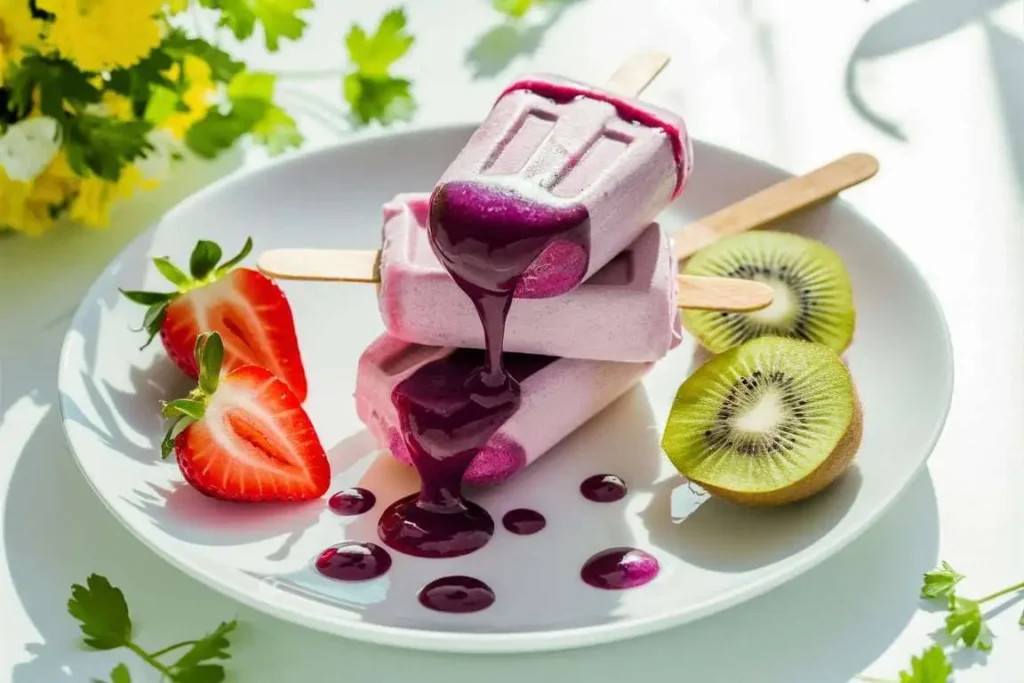
1. Acai-Infused Overnight Oats
Stir acai powder into your overnight oats mixture for a fruity twist. Add almond milk, chia seeds, and a handful of berries for a nutritious breakfast.
2. Acai Salad Dressing
Blend acai pulp with olive oil, balsamic vinegar, and a touch of honey for a unique, antioxidant-packed salad dressing.
3. Acai Popsicles
Mix acai pulp with coconut water and fresh fruit, then freeze in molds for a refreshing, guilt-free treat.
“Acai is like a chameleon in the kitchen—it blends into almost any dish you can think of!”
Wrapping It All Up: Should You Try Acai?
By now, you’ve got a comprehensive understanding of acai and its potential role in weight loss. To summarize:
- Acai is nutrient-dense: It’s packed with antioxidants, fiber, and healthy fats.
- It supports weight loss: Acai can help curb cravings, improve digestion, and stabilize blood sugar.
- It’s versatile: From smoothies to salad dressings, there’s no shortage of ways to enjoy it.
However, acai is not a magic bullet. It works best when combined with a healthy diet, regular exercise, and mindful lifestyle choices.
“Adding acai to your routine is like giving your health a little extra fuel. It won’t drive the car for you, but it’ll certainly help you go the distance.”
Final Thoughts
So, is acai good for you to lose weight? Yes, it can be! Acai is a nutrient-rich food that supports weight loss. It helps with digestion, controls hunger, and boosts energy. But remember, it’s not a magic fix. You’ll need to pair acai with healthy eating and regular exercise for the best results.

